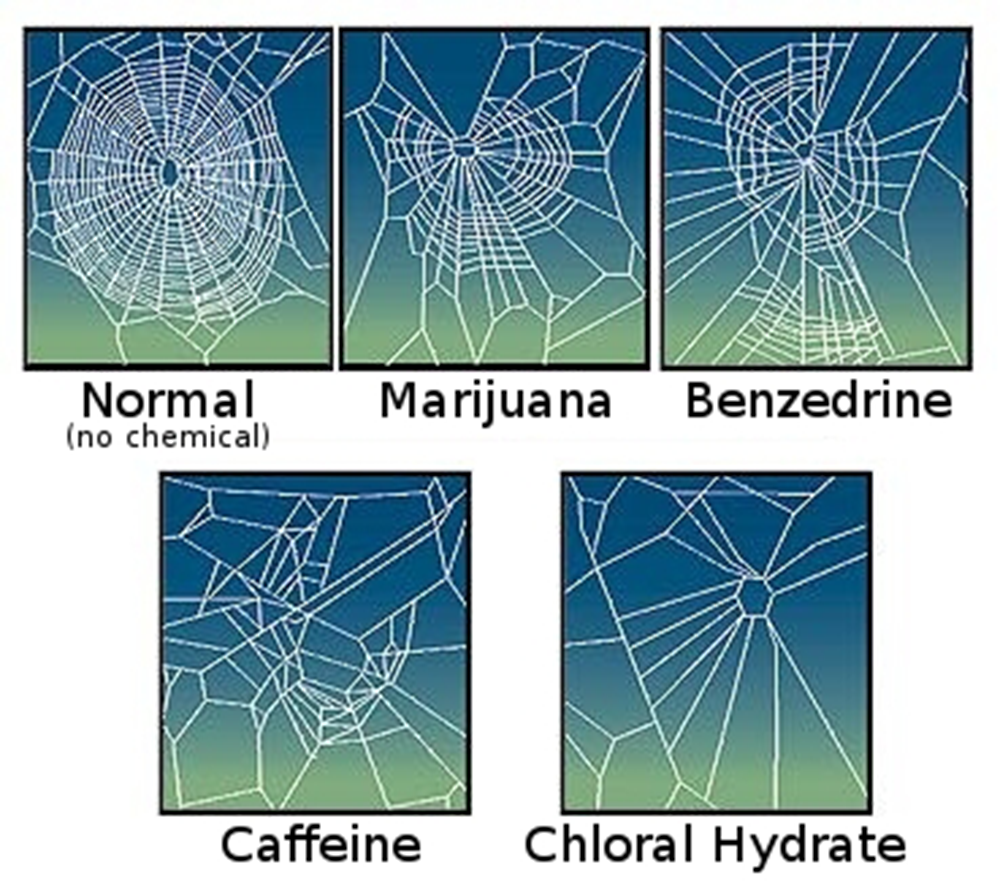US space agency NASA has a pretty great reputation around the world for its various missions exploring the Solar System. But it can conduct some pretty unusual research too, highlighted by the time they got spiders high on street drugs and watched what happened to their webs.
In 1948, Swiss pharmacologist Peter N. Witt began attempting to investigate the effect that drugs have on spiders. Keeping them in a temperature- and light-controlled room, he fed the spiders amphetamines, mescaline, caffeine, and LSD, as well as dosing them with carbon monoxide. Then, he watched the effect that these drugs had on the spiders’ web-making abilities.
Spiders know how to build their webs instinctively, not learning how to do so from other spiders.
“The first thing an orb-weaving spider needs to be able to do is to have one thread that is going across space,” Dr Beth Mortimer from the University of Oxford explains in a video for the BBC.
“They’ll then need to make a Y-shape. So they’ll go to the middle, attach another silk fiber, and pull it all down into a Y-shape.”
They then build mooring and structural threads around the outside of the web, before bringing some silk into the middle and attaching it to the web’s center.
“They’ll bring some silk into the middle and attach it into the center. They’ll then spend the majority of their web-building time slowly laying down this capture spiral.”
The spiders travel slowly around, building up their web into a fly-catching net. At least, that’s what they do when they aren’t off their cephalothorax on LSD.
LSD in high doses was, you probably won’t be shocked to hear, very disruptive to the spiders’ task, with some of the spiders abandoning their webs altogether. But at lower doses, they produced complex, three-dimensional webs. While pretty, and described as “strikingly psychedelic”, the webs would be fairly ineffective at catching prey. Spiders that ingested mescaline, a natural psychedelic produced by certain cacti, actually produced slightly larger webs.
While you might think that we’ve learned all we need to from feeding spiders illegal drugs, people working at NASA in the 1990s disagreed. In 1995, scientists from NASA’s Marshall Space Flight Center in Arizona repeated the experiments with cannabis, amphetamine, caffeine, and sedative chloral hydrate, and analyzed the webs.

Spiders on caffeine are particularly chaotic.
The team had good reasons for doing so; wanting to determine the toxicity of chemicals without testing on “higher animals”. They got similar results to Witt, including particularly messed up webs when the spiders were exposed to caffeine.
“The changes in webs reflect the degree of toxicity of a substance. The more toxic the chemical, the more deformed a web looks in comparison with a normal web. Inasmuch as the shape of a spider web resembles that of a crystal lattice in some respects, techniques of statistical crystallography are applied to obtain several quantitative measures of toxicity as manifested in the differences between photographs of webs spun under toxic and normal conditions,” the team writes in their study.
“The images of the cells are digitized and processed by an image-data-analysis program that computes various measures of the cellular structures of the webs, including numbers of cells and average areas, perimeters, and radii of cells. It appears that one of the most telling measures of toxicity is a decrease, in comparison with a normal web, of the numbers of completed sides in the cells: the greater the toxicity, the more sides the spider fails to complete.”
While other drugs have a stronger effect on humans, it is perhaps unsurprising that caffeine may have evolved for its toxicity to insects.
“The results suggest that, despite its prevalence in our daily lives,” a review of the topic from Atlantic International University explains, “caffeine may have more potent effects on the nervous system than we often realize.”
Source Link: NASA Study Gave Illegal Drugs To Spiders And Watched What Happened To Their Webs